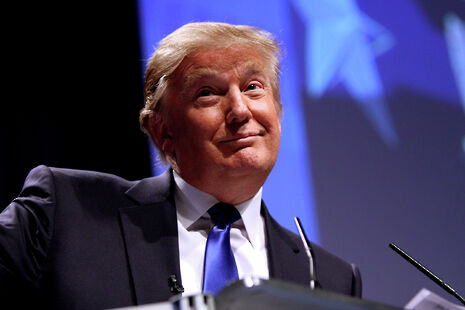Why has the U.S. media failed to challenge Trump?
Roger Mosey, Master of Selwyn College and former Head of News at the BBC, examines the tycoon’s extraordinary manipulation of the media

I'd just finished my student days when Ronald Reagan was elected president of the United States in 1980, and I well remember the disdain with which he was regarded by the chattering classes on both sides of the Atlantic. There was even a song on the BBC comedy show Not the Nine O'Clock News which listed all sorts of wildly improbable things – and ended with the punchline "but I can't believe Ronald Reagan is president". This for a man who had been a rather good two-term governor of California and went on to be seen as one of the most significant presidents in modern American history.
Press the fast forward key to 2016 and the prospect of Donald Trump moving into the White House is much more alarming. Nobody questioned Reagan's temper or his sanity: he was simply firmly on the political right. By contrast, every day seems to produce a fresh story about Trump doing or saying something that would have been unthinkable in any previous election, and which would disqualify him from office in almost every other major democracy. It is very hard to imagine a Trump presidency having the benign outcome that most historians credit to Reagan.
This could be a deeply serious moment for America and the world. But the closing days of the campaign also pose a formidable challenge for the media as they seek to report a campaign like no other – and try to work out what is their responsibility within a democratic process.
People like me who spent decades in the BBC are used to ideas of impartiality and balance. When there's a general election in the UK, the stopwatch comes out and on all the main broadcast channels each party is given an arithmetical allocation of airtime. You will hear equally from the Conservatives and Labour, and a specified amount less for the smaller parties. In the United States, this kind of regulation disappeared decades ago; but even so there has traditionally been an attempt at 'fair' coverage of the respective candidates.
That has been blown apart by Trump for a number of related reasons. The first is that Trump is so brazenly a creator of news: over the top, at times demagogic – but always quotable and, yes, frequently entertaining. This has meant that he generates enormous ratings, with tens of millions of people tuning in to debates even in the early stages of the Republican primary season. Jeb Bush, Ted Cruz, Carly Fiorina and all the rest were swamped by the tide of Trump – and the news programmes focused on him to the exclusion of alternative views or appropriate challenges to what he was saying. "It may not be good for America, but it's damn good for CBS", said one network TV president: "the money's rolling in and this is fun."
Trump has brilliantly harnessed social media with more traditional platforms. His 140-character interventions on Twitter set the agenda for the broadcast news programmes – and just when Hillary Clinton is making the running with a policy announcement, in comes the latest Trump diatribe about the people who are 'clowns' or 'dummies', or there's another verbal attack on a woman for being not quite as beautiful or respectful as he thinks they should be.
I have in my time as a journalist sometimes been dismissive of regulators and what may appear to be a 'nanny state' approach to broadcasting in a time of unlimited digital choice. But what has happened in the United States this year makes a formidable case for the kind of public broadcasting that remains strong in Europe. It is inevitable everywhere that digital media will fracture the audience and weaken our public discourse, but the likes of the BBC in Britain and ARD/ZDF in Germany can provide the platform for mass audiences to make a fair assessment of the people who seek to lead us.
And I should emphasise that I don't believe that this is about propaganda from the liberal-left establishment as a counter to the barrage of menacing soundbites from Trump. Nor is it about shouting him down or turning off his microphone. It's actually a case where we need classic journalism, of the kind which too much American television lacks – and which is absent altogether from most posts on social media.
Trump's policy platforms do not add up. Mexico is not going to pay for a wall across the border and his immigration policy is undeliverable. His foreign policy is riddled with inconsistencies and potentially dodgy alliances. His economic policies include a reduction of tax revenue potentially as high as $5.9 trillion. I watch American network bulletins quite often, and analysis of these issues seldom surfaces. Instead, there's a daily tit for tat with Hillary saying one thing and Donald the other – and they're presented as two broadly equal and typical political candidates, each accused at times of telling lies.
I hold no brief for Mrs Clinton, and she is clearly an imperfect candidate. She must be scrutinised too. But the volume of nutty policies from Trump, the obvious personal flaws and the scale of some of the dishonesty put him in a different league – unprecedented in a major democracy in the time I've worked in journalism. His eagerness to attack journalism if he wins office should be enough of a warning that its freedom matters very much indeed – and in the coming weeks it will be put to one of its greatest tests.
Roger Mosey is Master of Selwyn College. During his time as a BBC executive, he was described by Donald Trump as "a total lightweight who doesn't have a clue".
 News / Cambridge climbs to third in world Uni rankings11 October 2025
News / Cambridge climbs to third in world Uni rankings11 October 2025 Features / How to spend a Cambridge summer12 October 2025
Features / How to spend a Cambridge summer12 October 2025 Comment / Bonnie Blue is the enemy, not the face, of female liberation13 October 2025
Comment / Bonnie Blue is the enemy, not the face, of female liberation13 October 2025 News / Join Varsity this Michaelmas13 October 2025
News / Join Varsity this Michaelmas13 October 2025 News / Tompkins Table 2025: Trinity widens gap on Christ’s19 August 2025
News / Tompkins Table 2025: Trinity widens gap on Christ’s19 August 2025









